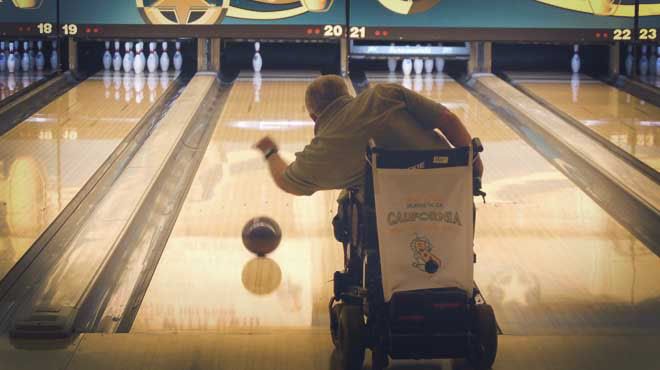Wheelchair Bowling In America
The landmine laid in the landing zone where Dave Roberts turned to survey his platoon likely was meant for the helicopter that brought him there. But in Vietnam, where the indiscriminate lottery of fate left many wondering why they were saved while others never made it home, the chopper landed safely and the landmine, instead, awaited Roberts as he stepped off.
“It was surreal, the explosion seemed like it was miles away,” Roberts says of the day he lost his legs in Vietnam. “It never dawned on me that I was losing enough blood to die.”

Whatever might have dawned on Paul Cook the day he, too, stepped on a landmine is anyone’s guess.
“I don’t want to talk about it,” Cook, also a Vietnam vet, says of the war that took both of his legs and an arm.
“Paul is one of the most remarkable individuals I know,” Roberts says of his fellow wheelchair bowler. “He is a triple amputee, but he just maintains a tremendously positive attitude and the best competitive spirit — he exemplifies sportsmanship.”
Nearly 30 years after Roberts and Cook came home with their lives forever altered by war, a man whose own tragedy would soon connect his life with theirs left his office building in Houston and collapsed to the ground when a malfunctioning door slammed into his chest. A victim of polio at 18 months old, Gary Ryan already required the assistance of crutches to get around. Now, even crutches would seem like a luxury.
“I landed on my left shoulder and ripped all the ligaments loose. I needed eight screws in my shoulder and it took a year-and-a-half to rehab,” Ryan says of the injury. “When you lose your arms and you’re on crutches, your arms are your legs. I couldn’t go from one point to another without an attendant who lived in my home for the next seven months.”
But years before polio assigned Ryan to a life on crutches, even before Roberts and Cook boarded a plane for a fateful stint in Vietnam, a man named Richard F. Carlson showed up for the Southern Bowling Congress Tournament in Louisville, Ky. and had a dream that would unite them for good.
Carlson was the only wheelchair bowler to show up for the SBCT that year; but today hundreds of wheelchair bowlers from coast to coast compete regularly thanks to his vision of an American Wheelchair Bowling Association.
Operating under the slogan “Ability Not Disability,” the AWBA was founded by Carlson in 1962 and now boasts about 500 members. The members’ common ground might be rooted in adversity, but the bond they share on the lanes is rooted in a friendship stronger than family ties.
“I am closer to quite a few of them than I am to my own family,” Cook explains of his fellow AWBA members.
For Ryan, that friendship is not just an extended family — it is the thing that saved his life.
To continue reading this story, please visit
bowl.com

